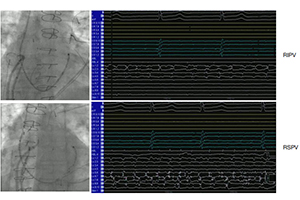Management of refractory atrial fibrillation post surgical ablation
Abstract
Over the past two decades, invasive techniques to treat atrial fibrillation (AF) including catheter-based and surgical procedures have evolved along with our understanding of the pathophysiology of this arrhythmia. Surgical treatment of AF may be performed on patients undergoing cardiac surgery for other reasons (concomitant surgical ablation) or as a stand-alone procedure. Advances in technology and technique have made surgical intervention for AF more widespread. Despite improvements in outcome of both catheter-based and surgical treatment for AF, recurrence of atrial arrhythmias following initial invasive therapy may occur.
Atrial arrhythmias may occur early or late in the post-operative course after surgical ablation. Early arrhythmias are generally treated with prompt electrical cardioversion with or without antiarrhythmic therapy and do not necessarily represent treatment failure. The mechanism of persistent or late occurring atrial arrhythmias is complex and these arrhythmias may be resistant to antiarrhythmic drug therapy. The characterization and management of recurrent atrial arrhythmias following surgical ablation of AF are discussed below.
Cover






